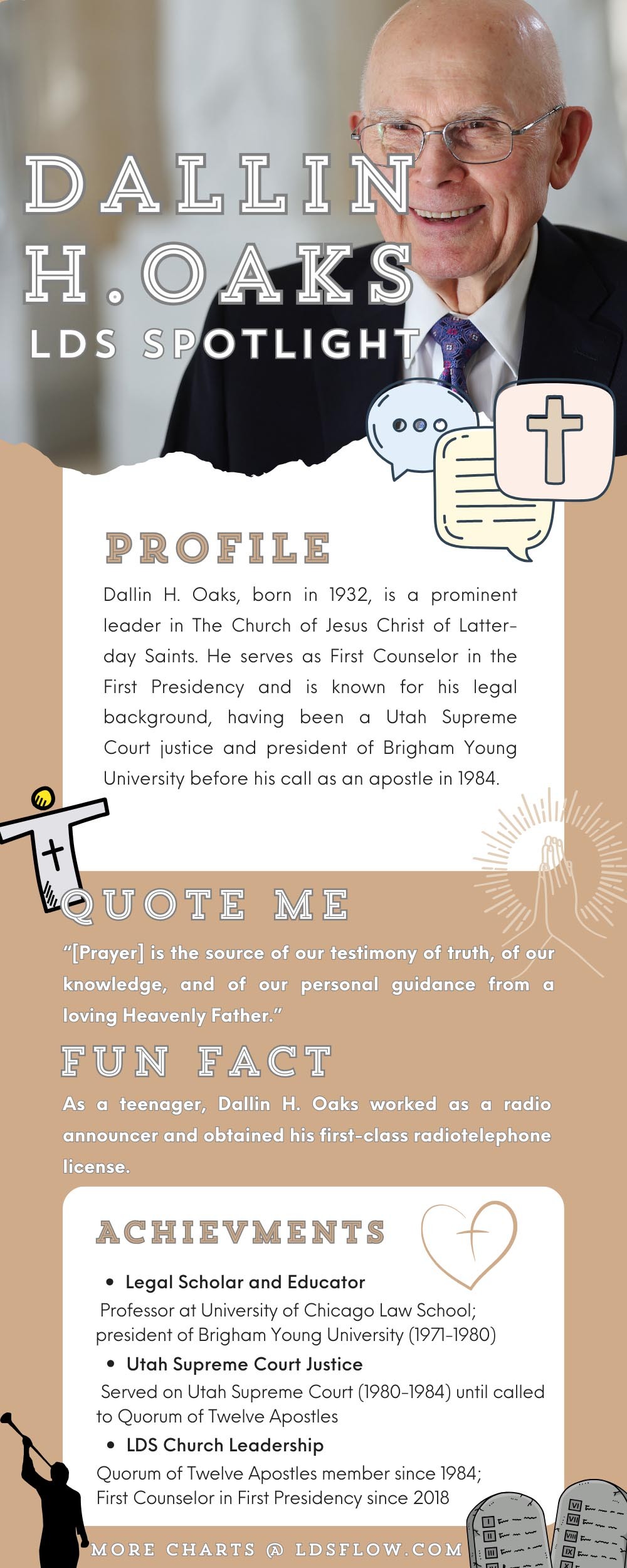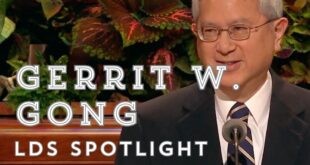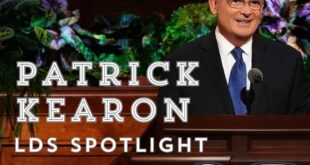Early Life and Education
Dallin Harris Oaks was born on August 12, 1932, in Provo, Utah. He is a prominent religious leader, former jurist, and academic who has played a significant role in The Church of Jesus Christ of Latter-day Saints (LDS Church). Oaks’ early life was marked by both tragedy and resilience. When he was just two years old, his family moved to Twin Falls, Idaho, where they lived until Oaks was eight. Tragically, his father died of tuberculosis in 1940, leaving his mother to raise him and his two younger siblings.
After his father’s death, Oaks faced several challenges. His mother experienced a period of mental illness, during which time Oaks and his siblings lived with their maternal grandparents in Payson, Utah. This upheaval in his young life caused difficulties in his schooling, but Oaks persevered. By the age of nine or ten, he was reunited with his mother, who had taken a teaching position in Vernal, Utah.
Oaks’ early experiences shaped his work ethic and determination. At the age of twelve, he obtained his first job sweeping floors at a radio repair shop in Vernal. His interest in radio continued, and he later worked as an engineer and announcer for stations in both Vernal (KJAM) and Provo (KCSU). By the spring of 1948, at just 16 years old, Oaks had obtained his first-class radio operator license.
Education played a crucial role in Oaks’ life from an early age. He attended Uintah High School in Vernal for his first two years of high school, where he was involved in football, debate, and played the oboe in the school band. When his family moved back to Provo, Oaks chose to attend Brigham Young High School (B Y High) for his junior and senior years. At B Y High, he continued his involvement in extracurricular activities, including football, track, band, and dramatic productions.
After graduating from high school in 1950, Oaks entered Brigham Young University (BYU). It was during his time at BYU that he met his future wife, June Dixon, whom he married during his junior year. Oaks graduated from BYU in 1954 with a bachelor’s degree in accounting, achieving high honors.
Oaks’ pursuit of higher education didn’t stop there. He went on to attend the University of Chicago Law School on a full-tuition National Honor Scholarship. At Chicago, Oaks distinguished himself academically, serving as editor-in-chief of the University of Chicago Law Review. In 1957, he graduated with a Juris Doctor (J.D.) cum laude, setting the stage for his future career in law and academia.
Legal Career and Academic Achievements
After his graduation from law school, Oaks’ legal career began with a prestigious appointment. He spent a year as a law clerk to Chief Justice Earl Warren of the U.S. Supreme Court. This experience provided Oaks with invaluable insights into the highest levels of the American judicial system.
Following his clerkship, Oaks entered private practice at the renowned law firm Kirkland & Ellis in Chicago. Here, he specialized in corporate litigation, working with major clients such as Standard Oil of Indiana, B. F. Goodrich, and Chemetron Corporation. Oaks quickly proved his legal acumen, being appointed as one of the firm’s principal lawyers early in his tenure.
In 1961, Oaks made a significant career shift, leaving private practice to become a professor at the University of Chicago Law School. This move marked the beginning of a distinguished academic career. During his time at the University of Chicago, Oaks taught primarily in the fields of trust and estate law, as well as gift taxation law. He also served as interim dean of the law school for a period.
Oaks’ academic contributions were substantial. He worked on updating a casebook on trusts with George Bogert and edited a book titled “The Wall Between Church and State,” which explored the relationship between government and religion in law. His writings extended to various legal topics, including evidence exclusion and the Fourth Amendment. Notably, Oaks was opposed to the exclusionary rule and favored prosecution in “victim-less crimes.”
In addition to his teaching and writing, Oaks took on other roles that broadened his legal and public service experience. In the summer of 1964, he served as assistant state’s attorney for Cook County, Illinois. He also acted as the faculty advisor to the legal aid clinic at the University of Chicago, working to address root issues facing the poor.
Oaks’ expertise and reputation in the legal field led to his consideration for nomination to the United States Supreme Court on two occasions. In 1975, he was one of eleven candidates considered for a vacancy, and again in 1981, he was considered by President Ronald Reagan, who ultimately nominated Sandra Day O’Connor.
Leadership at Brigham Young University
In 1971, Oaks’ career took another significant turn when he was appointed as the 8th president of Brigham Young University. His tenure, which lasted from 1971 to 1980, was marked by significant growth and development for the university.
As BYU president, Oaks oversaw several important initiatives:
- Establishment of new schools: Oaks was instrumental in starting the J. Reuben Clark Law School and the Graduate Business School at BYU.
- Enrollment growth: During his presidency, BYU’s enrollment grew by 20%, while maintaining an average class size of 34 students.
- Academic improvements: The number of faculty members with doctorate degrees increased to 22%, and library holdings expanded to 2 million volumes.
- Financial management: Church appropriations to BYU increased from $19.5 million to $76 million under Oaks’ leadership, and he also focused on fundraising and private donations.
- Gender equality: Oaks worked to improve the treatment of women in the workplace at BYU, instituting affirmative action policies and working to equalize salaries between male and female employees.
- Administrative reforms: Oaks created a Faculty Advisory Council and instituted a three-tiered system of general education examinations for undergraduates.
One of the most significant challenges Oaks faced as BYU president was navigating the university’s relationship with the federal government, particularly regarding issues of Title IX and religious freedom. Oaks led efforts to protect BYU’s ability to maintain its honor code and gender-specific housing policies while still complying with federal regulations.
During his presidency, Oaks also continued his scholarly work. He co-authored “Carthage Conspiracy: The Trial of the Accused Assassins of Joseph Smith” with BYU professor Marvin S. Hill, which received the Mormon History Association Best Book prize in 1976.
Oaks’ leadership style at BYU was characterized by a more moderate approach compared to his predecessor, Ernest L. Wilkinson. He sought to distance the university from partisan politics and established policies to prevent BYU administrators from participating in partisan political activities.
LDS Church Service and Later Career
After leaving BYU in 1980, Oaks’ career continued to evolve. He served as a justice on the Utah Supreme Court from 1980 to 1984, furthering his influence in the legal realm.
In 1984, Oaks’ life took a new direction when he was called as a member of the Quorum of the Twelve Apostles of The Church of Jesus Christ of Latter-day Saints. This appointment marked the beginning of his full-time service in church leadership, a role he continues to this day.
As an apostle, Oaks has been involved in various church responsibilities and has become known for his teachings on family, religious freedom, and moral issues. His legal background and experience in academia have informed his approach to church leadership and public engagement.
In 2018, Oaks was called as the First Counselor in the First Presidency of the LDS Church, serving alongside President Russell M. Nelson. In this role, he is involved in the highest levels of church administration and decision-making.
Throughout his career, Oaks has received numerous awards and honors, including:
- The Canterbury Medal from the Becket Fund for Religious Liberty in 2013
- The Distinguished Eagle Scout Award in 1984
Oaks’ influence extends beyond religious circles. He has served on the boards of several organizations, including five years as chairman of the board of directors of the Public Broadcasting Service (PBS) and eight years as chairman of the board of directors of the Polynesian Cultural Center.
Legacy and Continuing Influence
Dallin H. Oaks’ career spans law, academia, and religious leadership, making him a significant figure in American public life. His writings, speeches, and leadership have influenced discussions on religious liberty, education, and moral values in the United States and beyond.
As a senior leader in the LDS Church, Oaks continues to play a crucial role in shaping the direction and policies of one of the fastest-growing religious denominations in the world. His background in law and his experience in navigating complex social and political issues have made him a key voice in the church’s engagement with contemporary challenges.
Oaks’ life and career serve as an example of the intersection between faith, law, and public service. His ongoing work and influence ensure that his legacy will continue to shape discussions on religion, education, and civic engagement for years to come.





